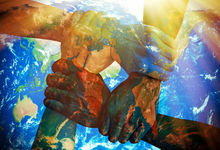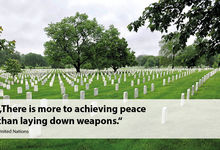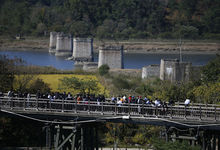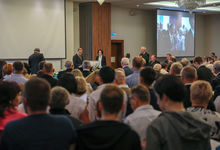Thinking peace
There are many slogans about peace. Perhaps the best known is “Make love, not war”, an anti-war slogan. A Christian motto is “Peace amidst our earthly fears”. This comes from Jesus Himself.

He said, “These things I have spoken to you, that in Me you may have peace. In the world you will have tribulation; but be of good cheer, I have overcome the world.”
What exactly does peace in Christ mean? This is an appeal to all Christians to take Him as an example.
- Jesus Himself experienced enough suffering to know how people feel when they go through pain or difficulties. He is close to them.
- Although Christians are part of the world, they are protected from evil. Jesus Christ Himself overcame the world and evil. And those who follow Him may share in this victory. All they have to do is trust in Him.
The peaceful will be called God’s children, not belligerent or quarrelsome individuals. In order to live in harmony with one another, compassion, love of one’s neighbour, and understanding for others must be something that is very valuable to one. Avoiding prejudice must become a priority again. Instead, patience and self-control should determine the way we interact with one another. Doing good to others paves the way to peace. And people who long for peace walk together on a common path!
Jesus is close to us even in trials
In His last words to His disciples, before He was arrested, the Son of God predicted that they would abandon Him. It was clear to Him though that He was not alone, but that God the Father was with Him. And here He is an example to all who follow Him. We too have to suffer through many things and often find ourselves in situations that fill us with fear or in which we have to deal with rejection and resistance. But we have reason to be comforted and find peace in Christ: He is there.
We are invited
- to pause and perceive God’s presence.
- to trust in God despite our anxieties about the current world situation and remember and make use of the power of prayer.
By their very nature, human beings cannot bring about lasting peace. But when they find it in Christ and accept it, they can pass on this peace and carry it into the world.
And the world needs it badly, because it would indeed appear that humanity has not yet realised how serious the situation is. Disputes, conflicts, and wars destroy within a short time what nature or a society has taken years to build up and establish. War destroys. It crushes. Ambition, the craving for power, and selfish attitudes pit people against each other. A “me first” sentiment can always only satisfy one person. Whereas “all of us together” satisfies and helps many.
Therefore, if we want to properly appreciate peace, we must uphold this one particular principle: all people are equal before God—even if tyrants and dictators refuse to acknowledge this. There is no such thing as inferior or superior, no small or great, no right or wrong. Seeing oneself as the standard in comparison with others is at best an expression of powerlessness and a lack of awareness rather than strength and authority.
Peace doesn’t cost a thing. It does not break anyone’s budget or the public purse. It does not need negotiators, bribes, contingency plans, or missile bunkers. Peace is completely silent and pleasant. Peace is like the child who gets up again when she has fallen down. Peace is life.
But does humanity want to be reminded of peace at all? Sometimes the wish for a peaceful world seems so bizarre, so infinitely far away. There is no end to the news of new wars. Children die for no reason. Civilian casualties are outlawed, but still happen almost every day! War reporting has become a profession, resistance fighters operate between fronts, and aid organisations wear blue helmets. It’s the same as always.
So should we stop dreaming about a peaceful world? Please don’t! If no one dreams of peace any more, war becomes normal. And Christians in particular are called upon to pray for peace. This is a requirement of the gospel.
International Day of Peace
In 2001, the United Nations (UN) General Assembly declared in UN resolution 55/282 that 21 September will henceforth be observed as the International Day of Peace. The World Council of Churches (WCC), joined this effort in 2004 and observes 21 September as the International Day of Prayer for Peace. Local and international communities are invited to pray and work together for a just peace in all communities and nations across the world. The New Apostolic Church has also officially observed the day since 2005.
This day is an opportunity for all of humanity to commit to peace and make peace a priority among the peoples of this world. The International Day of Peace is to be observed as a day of global non-violence and ceasefire. Prayers from different parts of the world are posted on the internet, for example on Facebook and Twitter.
May this peace captivate many more people! Peace in your own heart, in your family, in your community, in your congregation, and in the wonderful world in which we all live.
Photo: ssuni - istockphoto.com


















